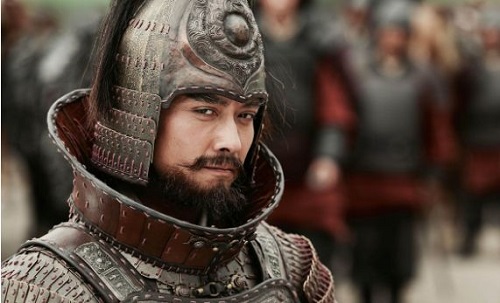In his youth, Phan Chương lived in poverty before following Tôn Sách in 196, who was the ruler of the Jiangdong region at that time. Phan Chương was renowned for his bravery in battle and his ability to overcome hardships, often achieving significant victories. He frequently accompanied Tôn Quyền into combat, where he defeated numerous mountain bandits, earning him the title of Biệt bộ tư mã (Special Commander), and he later rose to become Đại thị thứ gian (a legal official) in Jiangdong, before moving on to serve as an official in Dự Chương. During this period, the area was often plagued by banditry, but when Phan Chương arrived, he successfully quelled the chaos. Later, seeing that Kiến Xương was also troubled by bandits, Tôn Quyền transferred him there as a military advisor. Within a month, the bandit threat was neutralized, and the people returned to rebuild their lives. Phan Chương was then called back to Kiến Nghiệp.
In 209, Tôn Quyền led an army to attack Hợp Phì, where two Wei generals, Trương Liêu and Lý Điển, fiercely resisted, launching continuous assaults on the camp. General Trần Vũ was defeated and killed, while generals Tống Khiêm and Từ Thịnh fled. Phan Chương, serving as the rear guard, steadfastly defended their position. He personally executed two fleeing soldiers from Từ Thịnh, which intimidated the troops and encouraged them to fight back, thus minimizing losses and earning accolades. He was then promoted to Thiên tướng quân (Heavenly General) and stationed in Bán Châu.

Illustrative Image.
In 215, Phan Chương joined Tôn Hiệu, Lã Mông, and Lỗ Túc in an expedition against the southern region of Kinh Châu, which was then under Quan Vũ’s control. The two sides later reached a temporary truce.
By 219, Tôn Quyền sent Lã Mông to attack Kinh Châu while Quan Vũ was occupied in the north. The forces of Ngô quickly captured the region. Phan Chương and Chu Nhiên were assigned to block Quan Vũ’s retreat to the west. Ultimately, one of his subordinates, Mã Trung, captured Quan Vũ and his son, Quan Hưng, in early 220. In recognition of his achievements, Tôn Quyền promoted him to Chấn uy tướng quân and appointed him as the governor of Cố Lăng, granting him the title of Lật Dương hầu (Duke of Lật Dương).
Following the death of General Cam Ninh, Phan Chương took command of his entire army.
In 222, the Emperor of Shu, Lưu Bị, launched an eastern campaign against Đông Ngô’s Di Lăng. Phan Chương fought alongside Lục Tốn and Chu Nhiên to repel the Shu forces. Phan Chương’s troops killed the enemy general Phùng Tập and defeated many of Lưu Bị’s soldiers at Di Lăng. For this victory, he was appointed Bình Bắc tướng quân (General of Pacification) and governor of Tương Dương.
In 223, the Wei general Hạ Hầu Thượng attacked Chu Nhiên in Nam quân, prompting Gia Cát Cẩn and Dương Xán to lead a rescue operation. Phan Chương recognized the strong morale of the Wei forces and decided against a direct confrontation. Instead, he implemented a strategy of arson, sending troops ahead 50 miles to gather reeds and set fire to the floating bridges used by the Wei army. Taking advantage of this chaos, Gia Cát Cẩn launched a counterattack against Hạ Hầu Thượng’s forces, forcing them to retreat. Phan Chương then withdrew to Lục Khẩu for defense.
In 227, following a major victory over the Wei army, Tôn Quyền was returning when Phan Chương was pursued by enemy forces in a perilous situation. Fortunately, he was rescued by Chu Nhiên. After Tôn Quyền ascended to the throne as the Emperor of Đông Ngô in 229, Phan Chương was appointed as Hữu tướng quân (Right General).
Phan Chương passed away in 234, though his exact age at death remains unknown. He was regarded as a brave and strict general but had flaws, including a tendency towards debauchery, alcoholism, and a disregard for the law. He had a son named Phan Bình.
In the historical novel “Tam Quốc Diễn Nghĩa” by La Quán Trung, the character Phan Chương dies before the battle of Di Lăng (221). He is depicted as being haunted by the spirit of Quan Vũ and ultimately killed by Quan Hưng, who retrieves the Thanh Long Yển Nguyệt Đao (Green Dragon Crescent Blade). This event is entirely fictional, as historical records show that Quan Hưng was a civil officer and that Phan Chương achieved a significant victory in 223 using fire tactics. He died in 234. La Quán Trung likely crafted this narrative to “avenge” Quan Vũ, creating fictional deaths for those responsible for his demise, including My Phương, Phó Sĩ Nhân, Mã Trung, Phan Chương, and Chu Nhiên. In reality, these historical figures lived longer than Lưu Bị.